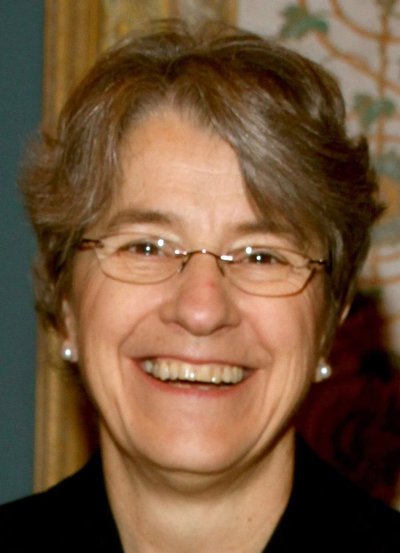By Judith Yarrow
UW Health Promotion Research Center
What brings a national leader in healthy aging across the country to share an office at the UW for the summer?
“I came here because the Seattle area has a unique configuration of academic, community and health care professionals working collaboratively to figure out how to improve population health among older people,” said Nancy Whitelaw, senior vice-president of the National Council on Aging (NCOA) and director of its Center for Healthy Aging.
Whitelaw left her Washington, DC, office to spend July and August as a visiting scholar at the School of Public Health’s Health Promotion Research Center (HPRC). “The University of Washington and its community partners are the home of three important evidence-based models we promote around the country for healthy aging,” she said. “I couldn’t pass up the opportunity to spend some time with the experts at UW, Senior Services and Group Health Cooperative who developed the models.”
The programs she refers to are EnhanceWellness, a health promotion program that helps older adults manage their chronic health problems, PEARLS, an in-home counseling program that teaches practical depression management techniques to socially isolated seniors, and EnhanceFitness, a physical fitness program. (See our story on EnhanceFitness at http://uwnews.org/uweek/article.aspx?id=49567 )
Whitelaw is a northwest native, having grown up in Portland, Ore. After earning a BA and MA in sociology from Portland State University, she moved to the Midwest and completed her doctorate in health services organization and policy at the University of Michigan. She settled in Detroit, but for the past 10 years has commuted to her NCOA office in Washington, DC. “It sounds like a long commute,” she said, “but it’s short compared to the weeks I spend on the road visiting the 27 states I work with.”
NCOA is a nonprofit organization that brings together nonprofit organizations, businesses and government to develop creative solutions that improve the lives of older adults, particularly those who are vulnerable and disadvantaged.
Whitelaw has been working in the area of aging since 1971. Aging was barely on the research horizon at the time. “I was working on an MS in sociology, taking classes at night while working at a day job,” she said. “I was interested in social change and organizational networks, and my professor offered me a job coordinating a research project evaluating various models for delivering aging services. By the end of the project, I was committed to the field.”
“Nancy’s one of a handful of people responsible for the emerging national support for proven approaches to improving the lives and health of older adults,” said Dr. James LoGerfo, a professor of medicine, global health and health services in the UW Schools of Medicine and Public Health. LoGerfo was a principal investigator in the research that resulted in the EnhanceFitness program.
Whitelaw’s role is to translate the models to fit local conditions. “The Pacific Northwest has a long history of collaboration, consumer engagement and social change,” Whitelaw said, “and often models developed here aren’t seen as a feasible in many other areas of the country.”
In the 10 years that Whitelaw has been at NCOA, she estimates they’ve reached 25,000 people nationally, through more than 1,000 organizations offering programs such as EnhanceFitness. Although Whitelaw crafted NCOA’s approach to healthy aging, she is not just a visionary. Through site visits, monthly conference calls and webinars, she works with agency staff to find ways to embed the concepts of science and evidence in their delivery of services, using tools such as NCOA’s program cost calculator to assess per participant costs and fees and its online training models. She also helps organizations find funding for their programs from public agencies, employers and heath plans. In the past six years, Whitelaw estimates that NCOA and its partners have helped bring $50 million from public and private sources into healthy aging programming.
While she is at the UW, Whitelaw plans to review what is known about engaging older adults and community organizations in effective ways to improve health and strengthen collaboration with primary care. “In my job, I have too little time to explore the latest thinking about new models and approaches for improving the health of older adults,” she said. “Besides reading a lot, I also plan to meet with experts in health and aging and attend meetings of academic and community coalitions to see how the concept of collaboration among academics, community organizations, health care and consumers plays out in the real world.”
She will use what she has learned to shape NCOA’s healthy aging strategies, foster practice improvements and influence the national debate on health reform.
Whitelaw’s passion for her work is clear as she talks about what leads to health for older adults. “The story I carry around the country is that the health of older adult populations isn’t just about medical care, specialization and technology” Whitelaw said. It’s about communities and the multiple organizations — public housing, libraries, civic groups, aging services providers, primary care clinics — that can enhance, or undermine, the health of older adults. Equating health with medical care is too limited and doesn’t serve the nation or our aging population.”
Dr. Jeffrey Harris, HPRC director and UW professor of health services, expects the center’s investigators to benefit from Whitelaw’s broad perspective on healthy aging. “Nancy brings a 30,000-foot view of the resources available and needed to help older adults age healthfully,” he said. “The advantage for us is that her understanding of the issues is well grounded in local communities, where we do our work.” LoGerfo added, “Nancy has the political savvy to make things happen at the national level. She’s been indefatigable in the promotion of healthy aging, especially among disadvantaged groups, and her intellect, energy and ability to bridge the worlds of science and community are an invaluable model for us at HPRC. ”
